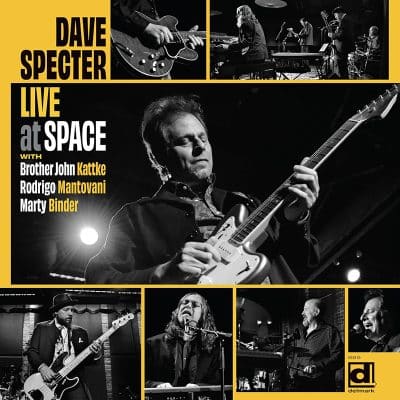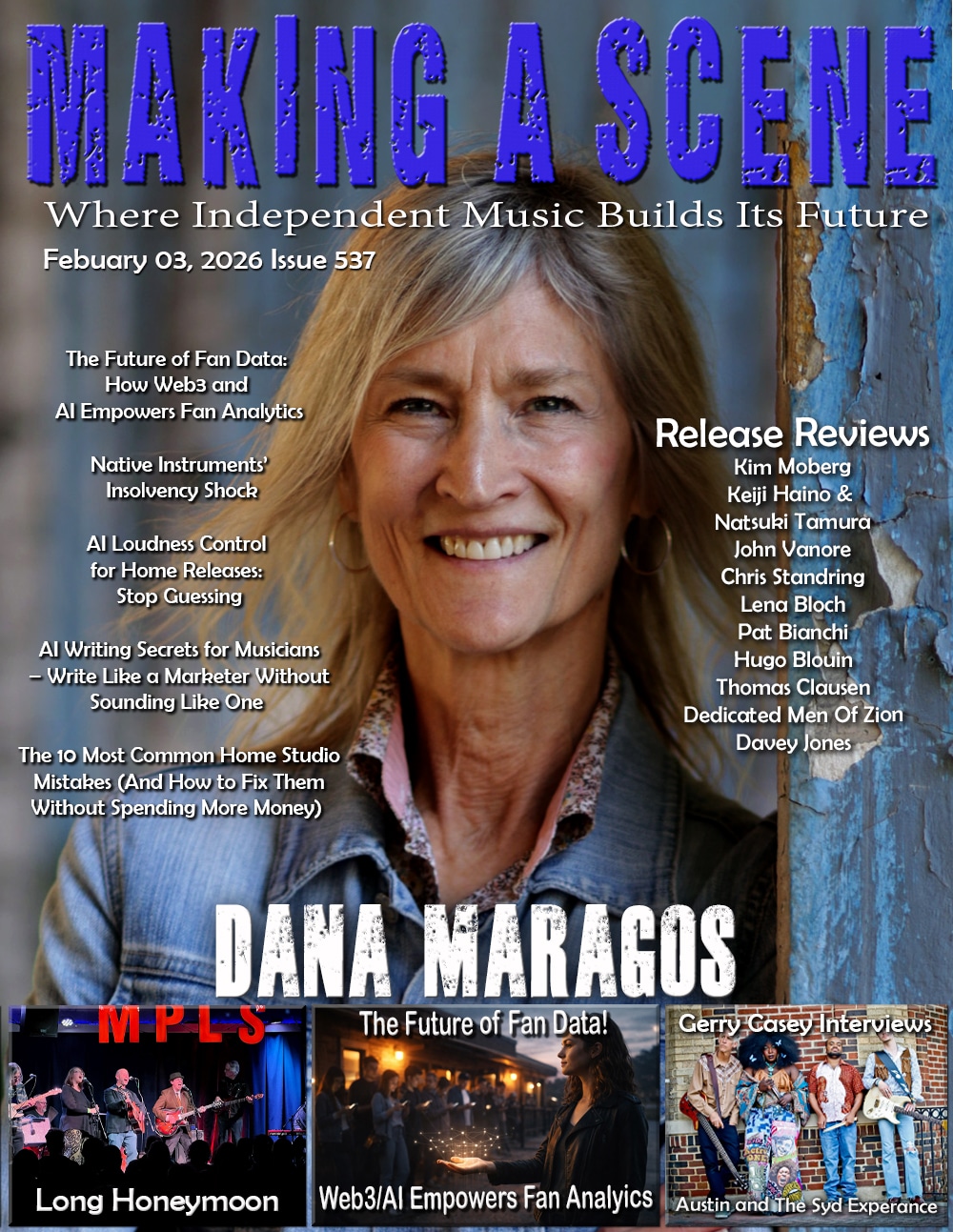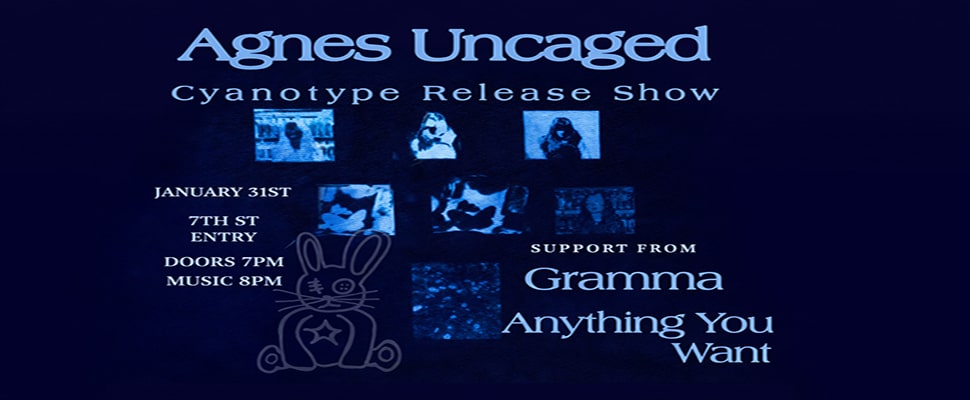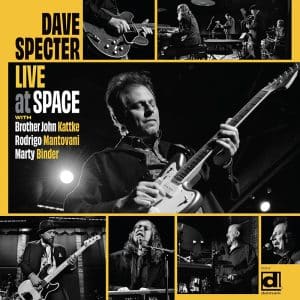Dave Specter Live At Space
 Dave Specter
Dave Specter
Live At Space
Delmark Records
Born in Chicago’s Northwest Side, in 1963, guitarist Dave Specter began to learn to play the guitar at the age of eighteen. His teacher was Steve Freund, who taught Specter between the latter’s duties at the Jazz Record Mart and Delmark Records. Freund ultimately organized a concert tour for Specter alongside Sam Lay and Hubert Sumlin. Contacts made while working at B.L.U.E.S. nightclub secured gigs as a sideman to Johnny Littlejohn, Son Seals, the Legendary Blues Band, Buddy Guy, Junior Wells, Otis Rush, and Robert Lockwood Jr.. Specter appears on over forty albums as guitarist or producer. By 1989 Specter had organized his own backing band, known as the Bluebirds. By 1998 Specter had released six albums on the Delmark imprint, the first being 1991’s “Bluebird Blues”. His influences were T-Bone Walker, Pee Wee Crayton, Magic Sam, Otis Rush, and jazz guitarist Kenny Burrell.
Specter has twelve previous albums on Delmark including 2004’s “Is What It Is” recorded with Freund and Barrelhouse Chuck; 2008’s CD/DVD “Live In Chicago” recorded with Jimmy Johnson, Tad Robinson, and Sharon Lewis; and 2014’s “Message In Blue” recorded with Otis Clay. His last studio album was 2019’s “Blues From the Inside Out. In 2021 Delmark released “Six String Soul” a thirty year retrospective. The band on this new album “Live At Space” includes Specter, guitar and vocals; Brother John Kattke, organ, piano, and backing vocals; Rodrigo Mantovani, bass; and Marty Binder, drums. Included are seven originals and six selected covers.
A Rhumba beat opens “Rumba & Tonic”, an original instrumental, with some Hammond organ and piano from Kattke, while the rhythm section lays down the strong founation. “Alley Walk” is another instrumental, this time a walkin’ blues with some blistering guitar. On “Homework” was originally recorded by Otis Rush in 1962, “I must be a fool waistin’ my time going to school, I can’t do my homework anymore…oh, baby, what can I do, I’m going around in circles, what can I do…I can’t do my homework any more”.
“Blues From the Inside Out”, with Kattke on piano, “well tough times can fill your heart with doubt, your livin in a trick bag of trouble, you got blues from the inside out, now you don’t have to drink the moonshine, just pay your dues and play these blues from the inside out”. “On Your Way Down” written by Allen Toussaint and recorded in 1972, “since the beginning it hasn’t changed yet…it’s the same friends you meet on the way up, you’ll see on the way down”. Specter states he was inspired by Mavis Staples when he wrote “March Through the Darkness”, “don’t ever slow down, march through the darkness until you see the light, and in our country let your voice be heard, march through the darkness, march, march into the light”.
“Chicago Style” where ever I go, whenever I travel…from Junior Wells to Buddy Guy to Magic Sam…Chicago style is my thing, it’s the blues and the sound…from the West Side to the south…stay awhile and hear the blues, Chicago style”. “Same Old Blues” originally recorded by Freddie King in 1971 “mornin’ rain…as I sit in my room…it’s the strain of the same old blues, I can’t help but thinkin’ that the sun used to shine on my back door, it’s the strain of those same old blues”. “The Stinger” is another infectious instrumental. “Deep Elem Blues” written by brothers Bob and Joe Shelton and recorded in 1946, featured is Kattke on piano, as Specter sings “when you do down to deep elem, put your money in your shoes, oh lord, sweet mama, you got those deep elem blues…oh lord, sweet mama, your daddy’s got them sweet elem blues”. “Bluebird Blues” was originally recorded by Sonny Boy Williamson in 1937, “bluebird, bluebird, please take this letter down south for me, cause I’m stuck in Chicago, and I’m just as blue as I can be”. “Ponchatoula Way”, “well I’m going to the river, Ponchatoula way, well going down to Mississippi, I’m going down to see my baby, she’ll be so happy I came around…yes I’ll be going down to Ponchatoula way, down in Louisiana where my baby used to stay”. The closer is “Ridin’ High” another instrumental written by Sam Maghet a.k.a. Magic Sam, with Kattke on the Hammond organ.
Dave Specter and Delmark Records have been together for over three decades. With “Live At Space” Specter writes a new and exciting chapter on this his fourteenth album. This is 21st century Chicago blues, anchored in tradition and open to the future, as good as it gets
Richard ludmerer
BUY NOW
Buy Us a Cup of Coffee!
Join the movement in supporting Making a Scene, the premier independent resource for both emerging musicians and the dedicated fans who champion them.
We showcase this vibrant community that celebrates the raw talent and creative spirit driving the music industry forward. From insightful articles and in-depth interviews to exclusive content and insider tips, Making a Scene empowers artists to thrive and fans to discover their next favorite sound.
Together, let’s amplify the voices of independent musicians and forge unforgettable connections through the power of music
Make a one-time donation
Make a monthly donation
Make a yearly donation
Buy us a cup of Coffee!
Or enter a custom amount
Your contribution is appreciated.
Your contribution is appreciated.
Your contribution is appreciated.
DonateDonate monthlyDonate yearlyYou can donate directly through Paypal!
Subscribe to Our Newsletter
Order the New Book From Making a Scene
Breaking Chains – Navigating the Decentralized Music Industry
Breaking Chains is a groundbreaking guide for independent musicians ready to take control of their careers in the rapidly evolving world of decentralized music. From blockchain-powered royalties to NFTs, DAOs, and smart contracts, this book breaks down complex Web3 concepts into practical strategies that help artists earn more, connect directly with fans, and retain creative freedom. With real-world examples, platform recommendations, and step-by-step guidance, it empowers musicians to bypass traditional gatekeepers and build sustainable careers on their own terms.
More than just a tech manual, Breaking Chains explores the bigger picture—how decentralization can rebuild the music industry’s middle class, strengthen local economies, and transform fans into stakeholders in an artist’s journey. Whether you’re an emerging musician, a veteran indie artist, or a curious fan of the next music revolution, this book is your roadmap to the future of fair, transparent, and community-driven music.
Get your Limited Edition Signed and Numbered (Only 50 copies Available) Free Shipping Included
Discover more from Making A Scene!
Subscribe to get the latest posts sent to your email.









